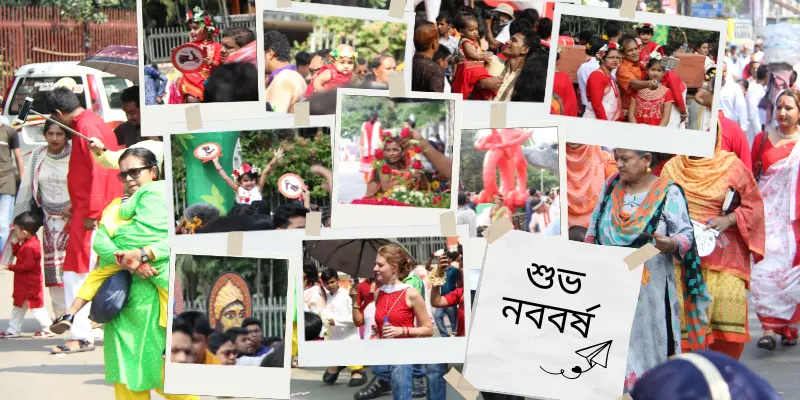
Pohela Boishakh: The Heartbeat of Bengali Culture in Bangladesh
Total Views : 614 | Published Date : April 14, 2025'Pohela Boishakh', the Bengali New Year, is one of the most significant cultural celebrations in Bangladesh. April 14 each year, it marks the first day of the Bengali calendar and brings people from all the spheres of society together in a colorful display of heritage, unity and festivity. From the vibrant streets of Dhaka to the far villages of the countryside. 'Pohela Boishakh' is not just a date, it is a powerful expression of Bengali identity.
The roots of 'Pohela Boishakh' go back to the Mughal period. Mughal emperor the great Akbar introduced the Bengali calendar to streamline the tax collection system based on the local harvest cycle. This practical financial reform with culture eventually gave birth to the tradition of celebrating the beginning of a new year with fairs, festivities and cultural programs. As the time passes, 'Pohela Boishakh' became a major secular festival embraced by all communities.
In Dhaka city, especially during the early and mid-20th century 'Pohela Boishakh' transformed from a regional festivity to a national cultural celebration. In the 1960s, under the cultural repression of West Pakistan, 'Chhayanaut'-a cultural organization began celebrating 'Pohela Boishakh' with musical performances under the banyan tree at 'Ramna Batamul'. This initiative not only preserved Bengali traditions but also acted as a form of resistance, making 'Ramna Batamul' a sacred ground for cultural re-birth.
One of the most iconic events of 'Pohela Boishakh' is the 'Mongol Shobhajatra', organized by the Faculty of Fine Arts (in Bengali it is called 'Charukola Institute') of Dhaka University. Started in 1989, this vibrant procession symbolizes giant masks, colorful floats and symbolic motifs representing peace, prosperity and the fight against evil. In 2016, UNESCO recognized this procession as an Intangible Cultural Heritage of Humanity, further highlighting its cultural significance.
'Mongol Shobhajatra' embodies the secular and inclusive spirit of 'Pohela Boishakh', welcoming people from all backgrounds to participate in the joyful march through the streets of Dhaka.
While Dhaka hosts grand urban festivities, on the other hand rural Bangladesh celebrates Pohela Boishakh with equal enthusiasm but in more traditional and organic ways. Villages come alive with 'Boishakhi Mela' (rural fairs), Jatra pala (folk theatre), Baul songs and shops selling traditional crafts and snacks. Locals dress in red and white adorn their homes with 'alpana' (colorful motifs) and engage in cultural programs that reflect the region’s rich heritage.
For rural communities, Pohela Boishakh also has economic importance. It marks the start of the new financial year for small businesses and farmers, who often open new account books known as 'Halkhata' with prayers and sweet distribution.
One of the most cherished parts of this celebration is the traditional Bengali cuisine. A typical 'Pohela Boishakh' meal includes:
a) Panta Bhaat – Fermented rice soaked overnight, served cold.
b) Shorshe Ilish – Hilsa fish cooked in mustard sauce.
c) Bhorta – A variety of mashed items like aloo (potato), begun (eggplant), dhoney pata (coriander), and shutki (dry fish).
d) Lentils (daal), green chili and seasonal vegetables.
e) Sweet treats like pitha, payesh and rosogolla.
These dishes, especially 'Panta Bhaat' with Shorshe Ilish, have become symbolic of the festival and are enjoyed in homes, restaurants and community events.
'Pohela Boishakh' is celebrated by people of all religions and backgrounds in Bangladesh. It serves as a unifying cultural force, fostering harmony and national pride. Offices, schools and media houses organize special programs, while people greet each other with “Shubho Noboborsho” (Happy New Year) and wear dress in traditional red and white attire.
Even in the corporate sector, brands join the celebration with 'Pohela Boishakh' themed marketing, making it a widely accepted and commercially celebrated event.
'Pohela Boishakh' plays a pivotal role in preserving and promoting Bengali cultural identity. At a time when globalization is influencing lifestyles, this festival reinforces the importance of traditions, language and community values. From folk music and crafts to traditional dances and cuisines, it creates a platform for showcasing Bangladesh's rich cultural tapestry.
It also fosters a secular spirit, distancing itself from religious divides and emphasizing unity, peace and national heritage. This makes 'Pohela Boishakh' not just a New Year celebration but a symbolic assertion of Bangladesh's cultural independence and pride.
Every year, 'Ramna Batamul' becomes the cultural epicenter of 'Pohela Boishakh' in Dhaka. Hosted by 'Chhayanaut', the day begins with classical and folk musical performances at dawn under the large banyan tree. This artistic beginning honors both nature and tradition, drawing thousands of attendees in peaceful celebration.
'Ramna Batamul' represents resistance, resilience and the renaissance of Bengali culture. Here the soul of 'Pohela Boishakh' finds its voice.
'Pohela Boishakh' is more than just a New Year festival. It is a celebration of 'we are Bengalis'. From the artful 'Mongol Shobhajatra' to the humble servings of 'Panta Bhaat' and 'Shorshe Ilish', from city streets to village courtyards, the day radiates unity, joy and a deep respect for tradition.
In an ever changing world, 'Pohela Boishakh' reminds Bangladeshis to pause, reflect and move forward rooted in culture, inspired by hope.
‘Shubho Noboborsho!’
Categories
- Popular Places 3
- Archeological Heritage 2
- Recent Incidents 1
- Nature 1
Featured Posts
